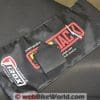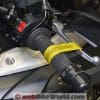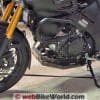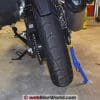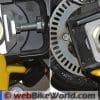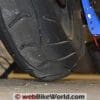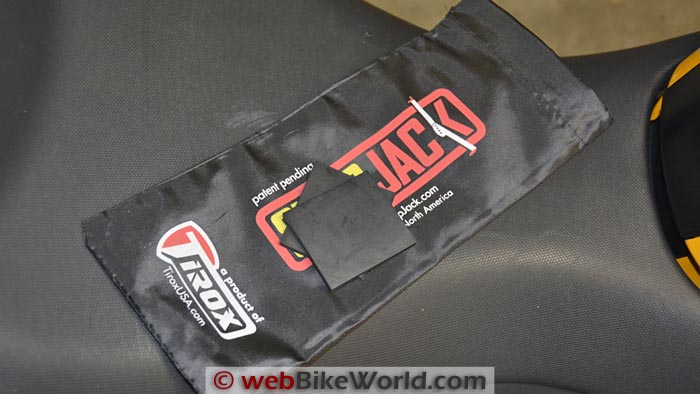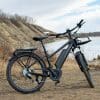The Snapjack is a portable motorcycle jack or lift for use during travel.
It lifts the rear of the bike enough to rotate the wheel for chain cleaning and/or a quick chain lube.
If you have a center stand, you don’t need a Snapjack and in the garage, either the center stand or a rear swingarm stand (reviews) are preferable.
The Snapjack is very well made and it has four adjustment ranges for different types of motorcycles.
It also comes with a strap to secure the front brake lever and we suggest securing the side stand to the front of the bike as well for extra security (see our video below).
The problem here is that some motorcycles have poorly designed side stands that might not be strong enough to hold the extra weight when the Snapjack is used.
It also takes a lot of practice to find the “sweet spot” placement for the Snapjack that lifts the rear wheel just enough to rotate but not so much that the bike falls over.
Which brings up another point: this is a potentially dangerous device and should be used with extreme caution. It’s best to have a friend (or two) on the left side of the bike as it’s lifted to help make sure the lift goes to plan.
It’s easier once you gain some experience using the Snapjack, but the danger should never be underestimated.
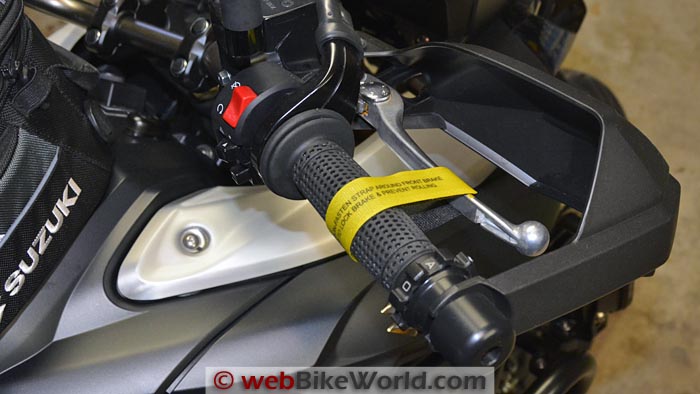
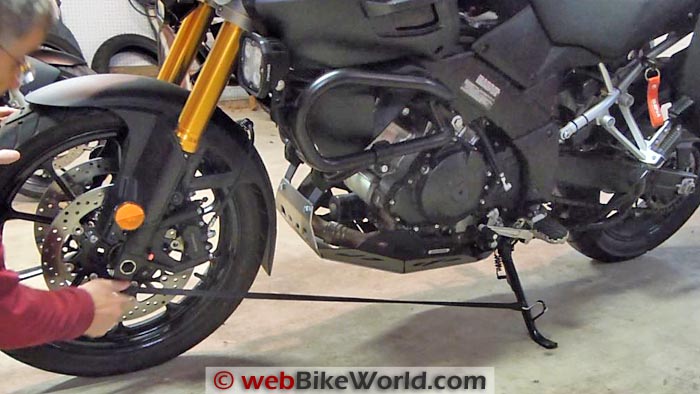
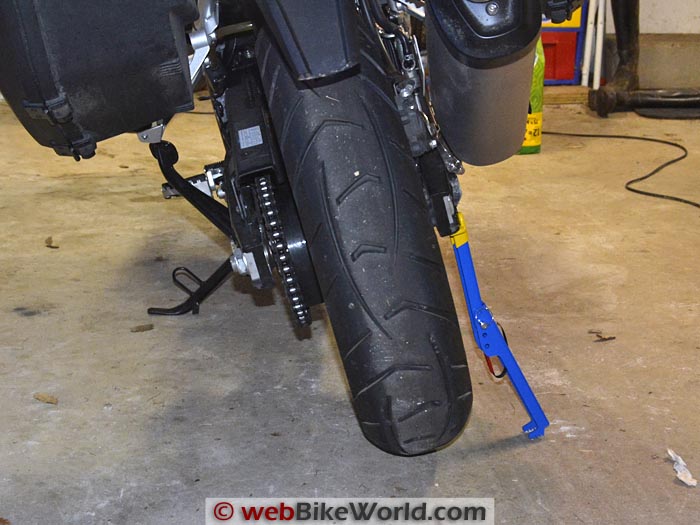
(Photo Above) The Suzuki V-Strom 1000 ABS (Blog) is probably the worst-case scenario for the Snapjack. The bike is big, heavy and tall, which makes lifting it more of a challenge.
Thankfully, the OE side stand is pretty hefty. Note also that this bike has the Suzuki center stand (review) installed, which obviates the need for the Snapjack. With the Snapjack in the position as shown, the wheel can now be rotated.
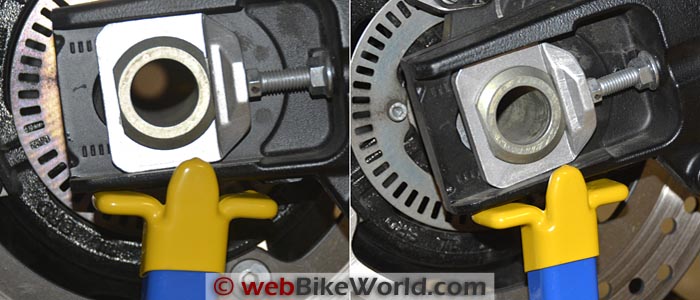
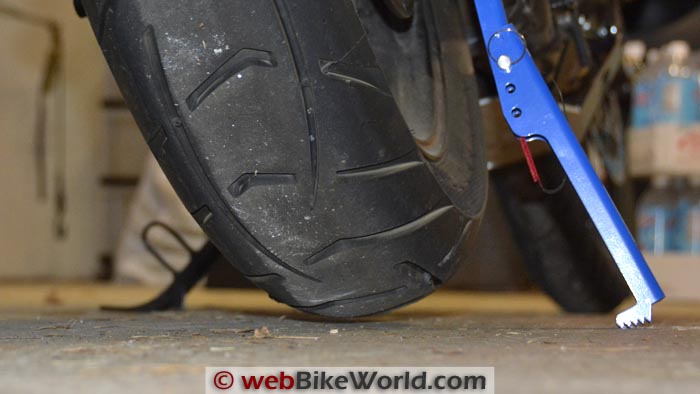
Watch the official Tirox SnapJack video on YouTube.
Notes on Using the Snapjack
Like the Tommy Jack (review), the Snapjack is designed to fit under the right side of the motorcycle’s swingarm. The instructions call for the base to be located about 4″ from the tire.
The trick is to find the correct location for your motorcycle that lifts the wheel just enough so it can rotate without tipping the bike over.
This takes a lot of trial-and-error and practice. I suggest having a friend standby on the opposite side of the bike to keep an eye on things as you practice. And don’t forget the brake lever holder and the tip about securing the side stand to the front of the bike.
We used the Snapjack only on one bike — the Suzuki V-Strom 1000 ABS (Blog).
The methods for using it with other motorcycles are the same, but the details will be different, such as the distance from the tire to the base of the Snapjack, the angle prior to lifting, the side stand type, etc.
The Snapjack has four positions that provide a range of heights. A pin with a ring is used to change the positions of the two halves of the device.
The foot of the Snapjack has large serrations, but the foot doesn’t stay parallel to the ground when the bike is lifted.
An improved design might have the serrated foot offset at an angle that brings it closer to all of the serrations touching the ground when the Snapjack is used.
Also, the top of the Snapjack that holds the swingarm is coated with a thick vinyl. Because the swingarm is at an angle, only about 60% or so of the flat portion touches the swingarm with the bike is lifted.
I’m not sure how this could be changed with a different design though.
One notable caution: the instructions and a label on the Snapjack warn the user about the “pinch point” where the two halves of the jack “snap” together.
Even though I was aware of this, it still nipped me and took a chunk from the palm of my right hand, as you can see in the video.
You may want to carry a heavy-duty leather work glove to use with the Snapjack and, in fact, I would recommend always wearing heavy leather gloves when working with this device.
Two of us experimented with the Snapjack as we were learning how to use it and I think it’s fair to say you’ll never get over the anxiety that the bike may fall over on the left side.
I wanted to use my left foot to push slowly on the Snapjack to lift the bike while standing and holding the handlebar and rear part of the bike’s frame, to keep the bike steady in case it tipped too far.
But it’s very difficult to engage the Snapjack with a foot, the angle just isn’t right
Response From the Manufacturer
The Snapjack is made to work easily on most sportbikes but we understand because of the vast number of designs and models that through trial and error, this may not work well for some configurations of motorcycles.
Heavy and taller bikes or bikes with unusually different or angled swing arms can be an issue.
However we are pleased that the Snapjack works very easily on most sportbikes that do not have a center stand and it’s a great tool for those 30% of riders who don’t own a rear wheel stand and who want to quickly clean and lube the chain or clean the rims.
We continue to improve on the design and our design team is now, because of the very important points from webBikeWorld, working on Snapjack Version 2.0.
This should help ease a lot of concerns and fit more bikes in a safer and more stable manner. We are also working on a single-sided swingarm model as per our patent criteria.
Conclusion
The Snapjack may be a useful tool for travelers to raise the rear wheel for a quick chain lube on the go.
Owners should be very aware of the dangers and cautions when using it however. To be honest, I’m not sure if the benefits outweigh the dangers.
If every motorcycle came with a center stand, there would be no need for a device like the Snapjack. In the garage, a rear swingarm stand or the center stand are the primary means of lifting a motorcycle so the rear wheel is off the ground.
UPDATE: This version no longer in production, a revised version is now available.
More webBikeWorld:
Owner Comments and Feedback
See details on submitting comments.
From “W.S.” (April 2016): “I have a Kawasaki ZZR1200 sport touring bike which my riding buddies refer to as: the “Winnebego”.
When loaded and full of gas, it is a beast to get on its centre stand generally requiring 2 people. Since I am a firm believer of chain lubrication when touring , the centre stand becomes a real pain!
I bought the Snapjack to overcome this issue and was very pleased. It is brilliant in its simplicity and easy to use.
I can see where some bikes might tip over to the left if the side stand digs into soft or uneven soil.
To counter this I installed an enlarged plate on the foot of the side stand giving more stability when required. These plates are widely available on the Internet — look under BMW accessories for quick reference.
The BMW foot extender plate required some drilling but was easy to install. I now can single-handily raise the rear wheel without the help of others! Great product!”
From “E.N.” (June 2015): “I have purchased the SnapJack as a fallback, as I also have a small contraption to insert under the wheel and roll it, but the SnapJack made anything else obsolete. It’s so compact and easily packed.
I had a Scottoiler on my Kawasaki Versys for 5 years and left it on the bike when sold it, also a great product but leaves a messy exhaust as there are many times it leaves too much oil. So I did not install anything on my MT-09 Yamaha and got the SnapJack.
It does take time and trial and error to find the sweet spot to plant it, releasing it could be dangerous but still it makes things easy for a single person to lube the chain without a center stand and it looks like the manufacturer has covered most of the problematic angles of this product.
I’ve been using it weekly for the last 6 months and I strongly recommend it.”
From “T.K.” (February 2015): “I was wondering if you’re familiar with the Quick Stand. It serves the same purpose and might be a better choice. For the record I have no experience and no vested interest in either product. P.S. If I were to go on a long tour I’d install an automatic chain oiler instead of using one of these contraptions. Just my 2 cents.”



